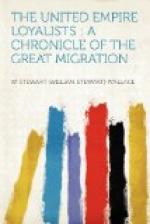Nor can there be any doubt that the coming of the Loyalists hastened the advent of free institutions. It was the settlement of Upper Canada that rendered the Quebec Act of 1774 obsolete, and made necessary the Constitutional Act of 1791, which granted to the Canadas representative assemblies. The Loyalists were Tories and Imperialists; but, in the colonies from which they came, they had been accustomed to a very advanced type of democratic government, and it was not to be expected that they would quietly reconcile themselves in their new home to the arbitrary system of the Quebec Act. The French Canadians, on the other hand, had not been accustomed to representative institutions, and did not desire them. But when Upper Canada was granted an assembly, it was impossible not to grant an assembly to Lower Canada too; and so Canada was started on that road of constitutional development which has brought her to her present position as a self-governing unit in the British Empire.
CHAPTER II
LOYALISM IN THE THIRTEEN COLONIES
It was a remark of John Fiske that the American Revolution was merely a phase of English party politics in the eighteenth century. In this view there is undoubtedly an element of truth. The Revolution was a struggle within the British Empire, in which were aligned on one side the American Whigs supported by the English Whigs, and on the other side the English Tories supported by the American Tories. The leaders of the Whig party in England, Charles James Fox, Edmund Burke, Colonel Barre, the great Chatham himself, all championed the cause of the American revolutionists in the English parliament. There were many cases of Whig officers in the English army who refused to serve against the rebels in America. General Richard Montgomery, who led the revolutionists in their attack on Quebec in 1775-76, furnishes the case of an English officer who, having resigned his commission, came to America and, on the outbreak of the rebellion, took service in the rebel forces. On the other hand there were thousands of American Tories who took service under the king’s banner; and some of the severest defeats which the rebel forces suffered were encountered at their hands.
It would be a mistake, however, to identify too closely the parties in England with the parties in America. The old Tory party in England was very different from the so-called Tory party in America. The term Tory in America was, as a matter of fact, an epithet of derision applied by the revolutionists to all who opposed them. The opponents of the revolutionists called themselves not Tories, but Loyalists or ‘friends of government.’
There were, it is true, among the Loyalists not a few who held language that smacked of Toryism. Among the Loyalist pamphleteers there were those who preached the doctrine of passive obedience and non-resistance. Thus the Rev. Jonathan Boucher, a clergyman of Virginia, wrote:




